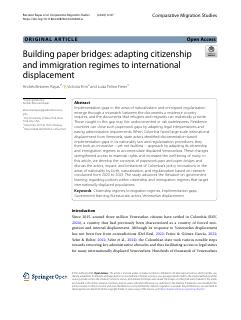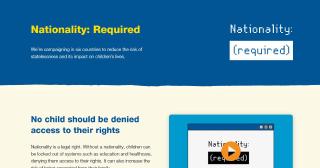“It has been 21 years since I have been without documents.”
Angélica, whose nationality is not recognised due to bureaucratic barriers
KEY ISSUES
- Colombia is one of few Latin American countries in which nationality is not automatically acquired by birth on its territory. The requirement of domicile and its interpretation by the authorities present a barrier to effective access to Colombian nationality.
- The law was amended in 2023 to introduce a pathway to nationality for a child born in Colombia if recognised to be stateless, but this is non-automatic and discretionary, and there is still no provision to guarantee nationality for foundlings.
- Colombia hosts a large number of Venezuelan undocumented refugees and migrants. Special time-bound regulations have been adopted to help ensure access to nationality for children of Venezuelans who would otherwise be at risk of statelessness.
- Other groups at risk of statelessness include members of Colombia’s indigenous population as well as people subject to internal forced displacement.
- In 2022, Colombia deprived more than 43,000 citizens of their Colombian national IDs. Most were understood to be dual citizens of Colombia and Venezuela, but there may be a risk of statelessness if those affected cannot establish their Venezuelan nationality.
- Colombia is a state party to both the 1954 and 1961 Statelessness Conventions and in 2021, the government introduced a statelessness determination procedure.
STATELESSNESS IN COLOMBIA
As one of few Latin American countries in which nationality is not automatically acquired upon birth on its territory, several groups in Colombia continue to be at risk of statelessness. Venezuelans face particular issues due to a combination of the evidentiary requirements for accessing Colombian nationality and the difficulty Venezuelans have in accessing that documentation while their country experiences a protracted crisis. This problem is exacerbated by the sheer number of Venezuelans that have arrived in Colombia throughout the 2010s and 2020s. As of August 2023, Colombia hosts approximately 2.8 million Venezuelans refugees and migrants. This number is greater than any other country in the Americas and makes Colombia the country with the third highest population globally of refugees and those in need of international protection. Although UNHCR has consistently reported Colombia to have only around a dozen stateless people, the actual number of people who are stateless or at risk of statelessness is therefore believed to be much higher.
Other groups at risk of statelessness include members of Colombia’s indigenous population as well as people subject to internal forced displacement. Although figures are unavailable, forcibly displaced people – especially in border regions – are at risk of not being able to assert their nationality and are thereby at risk of statelessness. Furthermore, indigenous and afro-descendent communities face additional barriers to register births and a heightened risk of having their nationality questioned. Moreover, language and cultural barriers often hinder their ability to secure the necessary Colombian identity and nationality documents, an issue that “the country has not specifically addressed”. Various reports describe how the Wayuu indigenous community, who live on the border between Colombia and Venezuela, is particularly affected by lack of proof of Colombian nationality, undermining their exercise of their right to nationality. Mobile birth registration trucks have been effective in the past in increasing birth registration rates among ethnic minorities, nomadic groups, children, migrants, and refugees.
Colombia is a state party to both statelessness conventions and, in August 2021, adopted a new comprehensive immigration policy in the form of Law 2136. This law established a statelessness determination procedure, under the authority of the Ministry of Foreign Affairs. Once recognised, stateless people are entitled various rights, such as the right to obtain travel documents and to a facilitated naturalization process. However, the Ministry of Foreign Affairs has not yet issued the administrative regulation that contains the detailed procedure as it was established by law.
THE RIGHT TO NATIONALITY IN COLOMBIA
The right to nationality can be found in the Colombian Constitution, which dates from 1991. Unusually for the Americas region, where many countries recognise unconditional jus soli (nationality by birth on the territory), Colombia’s jus soli rules are conditional: children do not acquire nationality just by being born in the territory, but must also have been born to at least one Colombian parent or a non-citizen parent who can establish valid residency in Colombia. Proof of residency and the intent to remain in the country is a key factor in being able to acquire Colombian nationality for those born on the territory to non-citizen parents. This intent can be established by the parents through the possession of resident and non-resident visas. The implementation of this rule posed a challenge for the large number of Venezuelan refugee and migrants who arrived in Colombia in the late 2010s, holding neither valid residency in Colombia nor the ability to access nationality documentation from Venezuela: their children were at risk of statelessness if born in Colombia. Special regulations were adopted to address this issue (see further below).
A landmark decision issued in 2020 by the Constitutional Court (T-006/20), considered the case of two children who were born in Colombia to Venezuelan parents in 2018, who had been recorded as not having any nationality. The claimants stated that their children had a constitutional right to Colombian nationality on the basis of their parents’ domicile in the country. The government had required that the parents provide a valid visa to prove their domicile, which they had been unable to do. The Constitutional Court found that requiring a visa to establish Colombian nationality amounted to a violation of Article 96 of the Constitution, as well as international law, due to the risk of statelessness. The Court found that domicile was to be interpreted as intent to remain, demonstrated as a matter of fact. This increased the flexibility of evidence that could be used to demonstrate domicile, reducing the evidentiary burden on parents in the assertion of their children’s Colombian nationality.
In 2023, the legislation was amended through the passage of Law 2332, introducing the possibility for children born within the territory who do not have a parent who is either a citizen or domiciled to access Colombian nationality by birth without proof of residency if the child is not recognised as a national of any other state. Thus, while the restrictive notion of domicile remains in place – despite rulings by the Colombian Constitutional Court – there is now a safeguard for cases where the child is recognised as stateless and complies with the requirements established by the National Registrar’s Office of Colombia (Registraduría Nacional del Estado Civil). However, this route to nationality is non-automatic and discretionary. Moreover, there is no provision in Colombian legislation to ensure nationality for foundlings.
Children born abroad to Colombian parents are entitled to obtain Colombian nationality at birth. However, in practice, Colombian returnees who had fled the country during the decades-long internal conflict have had difficulty confirming the Colombian nationality of their children whose births had not been registered abroad, because they do not have the documents to prove their nationality or because the Civil Registry has difficult requirements such as an apostilled birth certificate.
Colombians by birth hold greater rights than Colombians by naturalisation. Individuals who acquire Colombian nationality via naturalisation, despite birth on Colombian soil, are not allowed in all positions of public office. Further, while any Colombian nationality may be lost by renunciation, Article 33 of Law 2332 of 2023 states that naturalised Colombians are additionally capable of having their nationality revoked by committing crimes “against the existence or security of the State and the constitutional regime”.
THE RIGHT TO NATIONALITY FOR CHILDREN OF VENEZUELAN PARENTS
Throughout the Americas, children born to displaced Venezuelan parents have faced significant challenges accessing documentation and establishing their nationality. In Colombia, the problem is particularly profound due to the sheer numbers of Venezuelans present in the country; the additional requirements posed by Colombian law to access nationality jus soli; and the fact that many of the Venezuelans in the country had not regularised their status and so could not fulfil the necessary conditions to guarantee any children born in the territory access to Colombian nationality.
The recognition that large numbers of children of Venezuelan parents were exposed to statelessness, led to the adoption of two measures, in 2019: "Childhood First Strategy" ("Primero la Niñez") contained in the Resolución 8470 and Law 1997. Law 1997 created a presumption of temporary residence for the Venezuelan parents of children born in Colombia between 2015 and 2021; while Resolución 8470 allowed children born in Colombia to Venezuelan parents between 2015 and August 2021 to be recognised as Colombian citizens. In August 2021, the policy was extended for two years. An estimated 100,000 minors were reported to have benefited by August 2023 – when the policy saw a further two-year extension. However, some problems were reported in the administration of the procedure under Resolución 8470, including the limited availability of appointments, long queues and challenges for some parents to provide proof of Venezuelan nationality. Where administrative deficiencies or obstacles to birth registration come into play, children also face significant barriers in accessing nationality and may still end up stateless. Moreover, the risk of statelessness persists for children born in Colombia to Venezuelan parents who move on to other countries in the region, such as Chile, and are unable to obtain documents proving their Colombian nationality at Colombian consulates abroad, because the measure restricts its application to the consular level.
DEPRIVATION OF NATIONAL ID CARDS
In February 2022, Colombia deprived more than 43,000 citizens, most of whom were understood to also hold Venezuelan nationality, of their Colombian national IDs, following an internal review carried out by the Colombian Registrar to “identify inconsistencies” in dual nationality registrations. This decision also affected Colombians who moved to Venezuela and have now attempted to return, most of whom have Colombian parents. According to reports and extensive research by civil society organizations, the Registrar failed to effectively notify many of the affected individuals who were under review. The revocation of ID cards was carried out on a massive scale and did not provide an opportunity for citizens to present evidence or clarifications, leaving them without IDs and basic rights, at risk of detention and with vague instructions on how to reapply for their documentation.
While dual nationals were the targets of the measure, removing Colombian identification from people living in Colombia creates a risk of statelessness if an individual cannot prove their Venezuelan nationality or does not know that their Colombian nationality has been removed. Given how necessary the ID is for myriad services and rights across Colombia, its cancelation deprives those affected of the right to vote, stand for office, sign legally binding contracts, join the formal labour force and access healthcare. Research into the effects of cancelling ID cards concluded that it produced multidimensional and preventable harms.
Some research in Colombia has characterized this policy as tantamount to “arbitrary deprivation of nationality” given the lack of due process guarantees involved in the process. Legal challenges have been brought against the measure. On 23 February 2022, the Colombian Constitutional Court ruled that the Registrar improperly denied an ID to a Nicaraguan-Colombian woman due to inconsistencies in her documents. In May 2023, the Constitutional Court determined in Ruling T-183-2023 that the Registrar had acted without respecting due process right and had inflicted severe harms to those affected.
COLOMBIA’S INTERNATIONAL COMMITMENTS
Colombia has been a signatory to the 1954 Convention Relating to the Status of Stateless Persons since 2019. While Colombia has acceded to the 1961 Statelessness Convention since 2014 it maintains a reservation against Article 14 of 1961 Statelessness Convention regarding the jurisdiction of the International Court of Justice. Colombia has acceded to the CRC, ICCPR, CEDAW, ICERD, CRPD and ICRMW for which it maintains no reservations against the provisions relating to nationality. For more information on regional standards and intergovernmental commitments in Americas, see the StatelessHub Americas page.
The content on this page was reviewed by Ana María Moreno-Sáchica, Consultant on Migration and International Protection Issues
[Last updated January 2024]
Cover image by Fernanda Fierro



